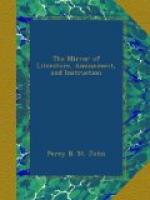him. We traversed rapidly the chamber of the
invalid lady, each inconsiderately repeating to her—“All
is lost!” We ascended a dilapidated staircase,
and passing through a small trap-door, what was my
astonishment, when I found myself in the Park!
There we beheld the said detachment of dragoons—an
affrighted mob; and many sinister-looking persons,
who seemed well satisfied at the evidence of our fears.
The gentlemen rushed out of the adjoining
cafe,
the English calling for their servants and horses,
(many of whom, by the way, who had never possessed
any;) one of these
fainted—no heart
of oak was
he, when our ancient Briton, the
commandant, Colonel Jones, again presented himself,
vif et emporte. The spectators exclaimed—“que
cela venoit de la trop rapide circulation de son sang.”
N’importe: the choleric Colonel,
blustering, restored us to comparative tranquillity,
as he brandished on high his sword, giving it an after-sweeping
movement, as if to
moissonner nos tetes; my
valiant compatriot extended on the pavement was the
only head in security. The Colonel commanded the
misled dragoons to return; and it appeared that they
had encountered some miscreants, disguised as British
officers, who gave them a forged official order to
retreat “the battle being lost!” We descended
through our trap-door, and re-assured our friend the
Comtesse, who seemed to have received our intelligence
(
en passant) with as perfect calmness as that
in which lay her new-born babe.
To add to my discomfort, deep and loud were the murmurs
on Sunday against the Duke. The merchants said
his Grace ought not to have lingered in the salons
of amusement one instant after he had been apprised
that Napoleon had quitted Paris, whose gigantic strides
all Europe had experienced during many long years.
They even denounced his life; while others, more moderate
but equally incensed, had commenced a written remonstrance
to the British Government: in such an excited
state were men’s minds!—Victory silenced
these despairing murmurers—success casts
its vivid radiance over the hero’s fame; what
so potent as its influence!
I took leave of my Belgian friends, who promised to
come for me (in case of a fatal termination), to share
their safety, and partake of the good cheer they had
prepared for our seclusion in the devastated caves
of that palace, which in olden time were filled with
the finest produce of Rhenish vintages. At three
o’clock entered the good Abbe Bernard, holding
up to view a paper with large characters imprinted—“The
French flying!—the City saved!—Victory!”
Never shall I forget my sensations at that joyful,
yet awful moment of restored peace to mankind!
The bells of the different churches chimed the exhilarating
note of victory! The good priest announced that
Te Deum was celebrating, and invited me to
accompany them to the noble cathedral, St. Gudule.
“What signify forms?” the good man said:




